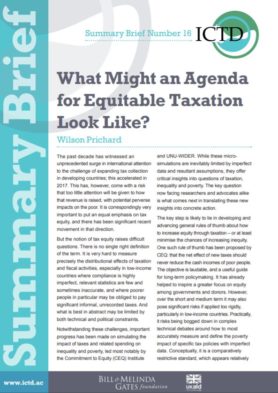ICTD Summary Brief 16
The past decade has witnessed an unprecedented surge in international attention to the challenge of expanding tax collection in developing countries; this accelerated in 2017. This has, however, come with a risk that too little attention will be given to how that revenue is raised, with potential perverse impacts on the poor. It is correspondingly very important to put an equal emphasis on tax equity, and there has been significant recent movement in that direction. But the notion of tax equity raises difficult questions. There is no single right definition of the term. It is very hard to measure precisely the distributional effects of taxation and fiscal activities, especially in low-income countries where compliance is highly imperfect, relevant statistics are few and sometimes inaccurate, and where poorer people in particular may be obliged to pay significant informal, unrecorded taxes. And what is best in abstract may be limited by both technical and political constraints. This brief seeks to clarify definitions, evidence and points of potential disagreement, and to suggest key elements of a potential future agenda: (1) stronger and broader personal income taxes, (2) more effective and simplified property taxes, (3) transparency around tax exemptions, (4) improved taxation of multinational corporations (MNCs), (5) reducing opportunities and incentives for informal taxation, (6) pairing consumption taxes with simple exemptions for essential goods, (7) efforts to expand civic engagement around tax issues and strengthen fiscal contracts, and (8) reasonable efforts to balance potentially poverty-increasing taxes with new transfers.
